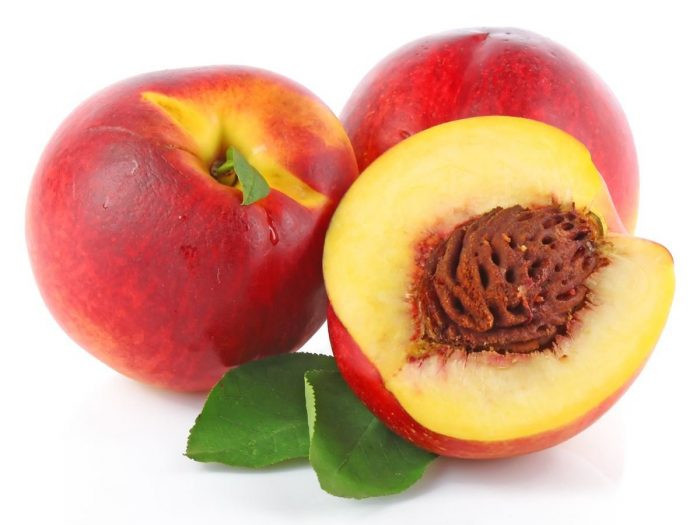Nectarines are a luscious nutrient-dense and low calorie fruit which brings a variety of healthy components to our diet. It offers an impressive array of powerful antioxidants and phenolic compounds along with dietary fiber. Vitamin wealth of nectarines include vitamin A, vitamin B1 (thiamine), vitamin B2 (riboflavin), vitamin B3 (niacin), pantothenic acid, vitamin B6, folate, vitamin C (ascorbic acid), vitamin E (alpha-tocopherol) and vitamin K (phylloquinone) . Nectarines are excellent sources of potassium and other minerals such as phosphorous, magnesium and calcium without any harmful cholesterol.
Nectarines may prove useful in condition of obesity and its associated complications. Research studies have shown that stone fruits such as nectarines contains bioactive compounds such as anthocyanins, catechin, chlorogenic acid and quercitin derivatives which have the potential to combat obesity related medical conditions like diabetes and cardiac disorders. The anti-obesity and anti-diabetic qualities may work against the metabolic syndrome and decrease the oxidation of bad cholesterol which is implicated in obesity related heart diseases.

Nectarines contains lutein, an important nutrient which encourages eye health and helps reduce the risk of disease like age-related macular degeneration. Various investigative researches have shown that lutein is also an extremely powerful antioxidant which also helps in reducing the risk of nuclear cataract. Lutein dwells in the macular pigment of the eye and assists in protecting the retinal tissues from the damage caused by oxidative stress and high-wavelength light. In addition to this, beta-carotene present in nectarines encourages the synthesis of vitamin A and contributes in maintaining healthy eyesight and prevents diseases like blindness and xeropthalmia.
Prevention of hypokalemia
Nectarines contains potassium which is essential for proper nerve and cellular function. Potassium present in stone fruits such as nectarine helps in proteins synthesis, functioning of the muscles, maintain electrolyte balance, and optimally utilize carbohydrates and supports metabolic processes. Deficit of potassium in the body may lead to disorders like hypokalemia which may degrade the muscular health and may cause cardiac arrthymia.
Cardiac health
Regular consumption of stone fruits such as nectarines may prove beneficial in maintaining cardiovascular health attributing to the presence of heart friendly antioxidants. Chlorogenic acid and anthocyanins present in nectarines exert inhibitory action against the oxidation of LDL cholesterol, prevents hardening of arteries and encourages proper circulation of human platelets. Flavonoids found in nectarines may help in preventing rise in the aggregation of platelets and reduce the risk of development of atherosclerosis.
Health Benefits of Nectarines
Antioxidant defense: Nectarines have a wonderful antioxidant power with a good amount of polyphenols, vitamin C content and carotenoids such as beta-carotene and cryptoxanthin. The skin of the nectarine fruit has a higher concentration of such components as compared to the pulp so, just wash the fruit properly and eat unpeeled. These protective antioxidants exert free radical scavenging activities and assist in neutralizing the damaging effects of oxygen free molecules.Nectarines may prove useful in condition of obesity and its associated complications. Research studies have shown that stone fruits such as nectarines contains bioactive compounds such as anthocyanins, catechin, chlorogenic acid and quercitin derivatives which have the potential to combat obesity related medical conditions like diabetes and cardiac disorders. The anti-obesity and anti-diabetic qualities may work against the metabolic syndrome and decrease the oxidation of bad cholesterol which is implicated in obesity related heart diseases.

Nectarines contains lutein, an important nutrient which encourages eye health and helps reduce the risk of disease like age-related macular degeneration. Various investigative researches have shown that lutein is also an extremely powerful antioxidant which also helps in reducing the risk of nuclear cataract. Lutein dwells in the macular pigment of the eye and assists in protecting the retinal tissues from the damage caused by oxidative stress and high-wavelength light. In addition to this, beta-carotene present in nectarines encourages the synthesis of vitamin A and contributes in maintaining healthy eyesight and prevents diseases like blindness and xeropthalmia.
Prevention of hypokalemia
Nectarines contains potassium which is essential for proper nerve and cellular function. Potassium present in stone fruits such as nectarine helps in proteins synthesis, functioning of the muscles, maintain electrolyte balance, and optimally utilize carbohydrates and supports metabolic processes. Deficit of potassium in the body may lead to disorders like hypokalemia which may degrade the muscular health and may cause cardiac arrthymia.
Cardiac health
Regular consumption of stone fruits such as nectarines may prove beneficial in maintaining cardiovascular health attributing to the presence of heart friendly antioxidants. Chlorogenic acid and anthocyanins present in nectarines exert inhibitory action against the oxidation of LDL cholesterol, prevents hardening of arteries and encourages proper circulation of human platelets. Flavonoids found in nectarines may help in preventing rise in the aggregation of platelets and reduce the risk of development of atherosclerosis.